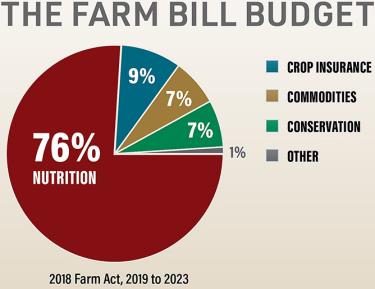 Representative G. T. Thompson (R-PA), Chairman of the House Agricultural Committee, will be hard pressed to satisfy the conflicting demands from within his party and within his Committee in framing the 2023 Farm Bill. Knowledgeable observers including former House Agriculture Committee Chair, Collin Peterson, have warned against extreme cuts to the Supplemental Nutrition Assistance Program (SNAP) on the one hand or advocating for far reaching policies that mitigate climate change on the other.
Representative G. T. Thompson (R-PA), Chairman of the House Agricultural Committee, will be hard pressed to satisfy the conflicting demands from within his party and within his Committee in framing the 2023 Farm Bill. Knowledgeable observers including former House Agriculture Committee Chair, Collin Peterson, have warned against extreme cuts to the Supplemental Nutrition Assistance Program (SNAP) on the one hand or advocating for far reaching policies that mitigate climate change on the other.
The Main Street Caucus led by Representative Dusty Johnson (R-SD) is in favor of moderate mandated work and education requirements for SNAP eligibility. The intent of this approach is to wean recipients from government support and to encourage a transition to independence. The Freedom Caucus and other conservative members of the House majority are in favor of severe cuts to SNAP that will elicit strong opposition from the minority party and Senate. Representative Thompson is critical of any extreme preoccupation on climate issues and will concentrate on expanding the production and export of agricultural products.
 Thompson has, in the past, exercised diplomacy and has demonstrated an ability to coalesce support among his party, pointing to success in modernizing SNAP. He stated “The best legislation is where you bring everybody to the table and find out what we can agree upon.” Representative Thompson has a personal knowledge of SNAP, benefitting from the program as a teenager and is conscious of the need for the program.
Thompson has, in the past, exercised diplomacy and has demonstrated an ability to coalesce support among his party, pointing to success in modernizing SNAP. He stated “The best legislation is where you bring everybody to the table and find out what we can agree upon.” Representative Thompson has a personal knowledge of SNAP, benefitting from the program as a teenager and is conscious of the need for the program.
At the end of the day, both the Chairman and the Ranking Member of the House Agricultural Committee will have to moderate the extremists in their respective parties and encourage productive concessions. This will enable passage of an equitable Farm Bill in the House that can then be reconciled with the Senate version.